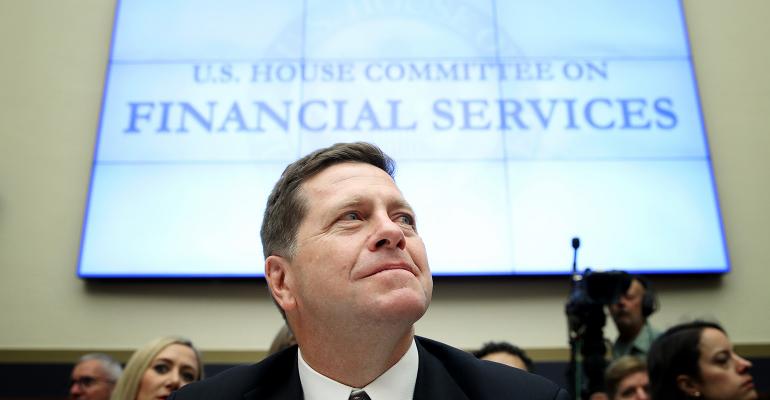Several House representatives laid out concerns about the Securities and Exchange Commission’s Regulation Best Interest (Reg BI), passed in June, arguing it weakened the standards of conduct for advisors and brokers, during a hearing of the House Committee on Financial Services on Tuesday morning.
“Unfortunately, I believe the rule was far too weak and did not raise the standard for brokers nearly enough,” said Representative Carolyn Maloney (D-N.Y.). “And to make it worse the SEC also weakened the fiduciary standard for investment advisors, which was completely unnecessary and goes against the SEC’s mission of protecting investors.”
Yet, Maloney as well as Representative Al Green (D-Texas) referred to the rule package as “Reg B1,” not “Reg BI,” which stands for Regulation Best Interest.
“The most important action the SEC has taken was in June, when they finalized Regulation Best Interest, or Reg B1,” Maloney said.
In his testimony, SEC Chairman Jay Clayton said, “For the first time, regardless of whether an investor chooses a broker/dealer or investment advisor, the investor will be entitled to a recommendation that is in the investor’s best interest and does not place the interests of the firm or the financial professional ahead of the investor’s.”
Commissioner Robert Jackson, disagreed, saying that the rules adopted by the SEC muddled the standards.
“My own view is that the law in the United States should be clear, that when there’s a conflict between an ordinary American investor and their financial advisor, the investor comes first,” he said. “I think we should be unambiguous about that in all that we do in our work.”
He said the SEC should use the authority laid out in the Dodd-Frank Act to set up a uniform and strong standard.
When Green asked, “are investment advisors true fiduciaries?” Clayton responded, “In both the investment advisor space and broker/dealer space, a professional can’t put their interests ahead of the clients, and for the first time, we’ve made that clear.”
And when Representative Bill Huizenga (R-Mich.) asked Clayton whether the agency has watered down the fiduciary standard, he simply said “no.”
Aside from Reg BI, another issue that came up during the hearing was the Stanford Ponzi scheme, with U.S. Rep. William Posey (R-Fla.) raising concerns about the victims of the scheme not getting their funds back.
There were over 21,000 victims of the scheme, Posey said, some of which reside in Posey’s district, who haven’t been repaid in any meaningful way.
“The Sanford victims have received approximately 4.5 cents on the dollar, while the seemingly more influential or well-connected victims to the Madoff scheme have received 75 cents on the dollar in recovery,” he said. “Obviously it is not acceptable.”
The receiver has recovered just $750 million of the $5 billion lost.
“What is more appalling than that, is that nearly 50% has gone into the pocket of the receiver,” Posey said.
Further, the receiver has recently barred individual investor claims against banks who potentially aided and abetted the Stanford scheme.
Commissioners Elad Roisman and Jackson called the situation “a travesty,” and Commissioner Hester Peirce said she would look into the issue.
Clayton said he just met with the receiver and examiner 10 days ago, so he is very familiar with the Stanford issue.
“I’m looking for any opportunity to help the victims get more money back faster,” he said.





